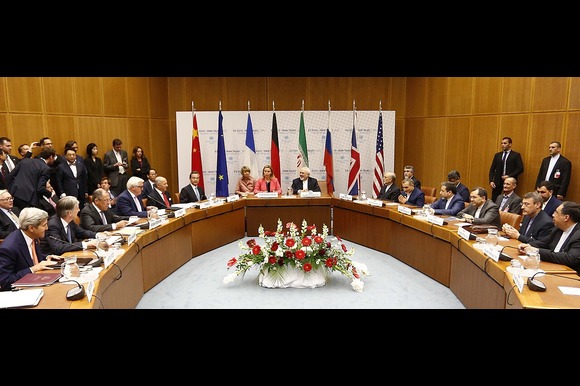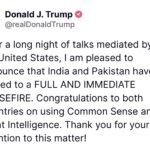Muscat, Oman – A fourth round of indirect nuclear talks between Iran and the United States has concluded in the Omani capital, Muscat, with Iranian officials describing the negotiations as “difficult but useful,” as both sides seek to bridge growing gaps over the future of Tehran’s nuclear programme.
The talks, held on Sunday and lasting approximately three hours, were facilitated by Omani mediation. Esmaeil Baghaei, the spokesman for Iran’s Ministry of Foreign Affairs, said the discussions helped both sides better understand each other’s positions.
“Difficult but useful talks to better understand each other’s positions and to find reasonable and realistic ways to address the differences,” Baghaei wrote in a statement following the session. He added that the “next round will be coordinated and announced by Oman,” in a post shared on the social media platform X.
Before the negotiations commenced, Iranian Foreign Minister Abbas Araghchi asserted to state media that Iran’s right to civilian nuclear enrichment is non-negotiable and cannot be subjected to any agreement.
“Iran has a legal right to civilian enrichment of uranium that cannot be subjected to any deal,” Araghchi emphasized.
The 2015 Joint Comprehensive Plan of Action (JCPOA), widely known as the Iran nuclear deal, had allowed Iran to pursue civilian nuclear activity while imposing strict limitations on uranium enrichment levels to prevent Tehran from developing nuclear weapons capabilities. However, the deal was unilaterally abandoned in 2018 by then-US President Donald Trump, who called it the “worst deal ever.”
“Enrichment is one of the achievements and honours of the Iranian nation. We have paid a heavy price for enrichment. The blood of our nuclear scientists has been spilled for this achievement,” Araghchi stated, referencing Iranian scientists who were assassinated over the years, widely attributed to Israeli intelligence operations.
Despite reaffirming Iran’s commitment to civilian nuclear technology, Araghchi reiterated that Tehran is open to providing “verifiable assurances” that it will not pursue a nuclear bomb. This assurance, he said, directly addresses Trump’s longstanding demand, which remains at the core of Washington’s concerns.
Ahead of the Muscat talks, Araghchi visited Saudi Arabia and Qatar, where he held meetings with senior officials in an effort to coordinate positions ahead of the latest round of negotiations.
The latest session in Muscat was attended by Iran’s top diplomats, including deputies and members of the technical negotiations team. As with previous rounds, the talks were conducted indirectly, with Oman serving as the intermediary.
Tehran has consistently voiced concerns about “contradictory” public remarks made by US officials, particularly negotiator Steve Witkoff, a longtime confidant of Trump. In the days leading up to the Muscat talks, Witkoff renewed calls for the “complete dismantlement” of Iran’s nuclear infrastructure, explicitly naming key facilities at Natanz, Fordow, and Isfahan.
The increasingly hardline stance was also echoed by US Secretary of State Marco Rubio and other senior officials, who have floated proposals requiring Iran to import enriched uranium rather than produce it domestically – a move Tehran has firmly rejected.
The fourth round of talks had initially been scheduled for early May but was postponed for what Oman described as “logistical reasons.” The delay followed the US’s failure to confirm its participation and came amid a wave of fires and explosions across Iran, including a devastating blast in the strategic port city of Bandar Abbas. The explosion resulted in dozens of deaths and over 1,200 injuries, further escalating tensions ahead of the meeting.
The diplomatic atmosphere was further shaken earlier this month when Trump dismissed National Security Adviser Mike Waltz, a vocal critic of Iran. Waltz had reportedly coordinated with Israeli Prime Minister Benjamin Netanyahu and lobbied for potential military action against Tehran. Both Trump and Netanyahu have consistently threatened to launch military strikes on Iran should the negotiations stall or fail to produce concrete results.
Parallel to the diplomatic talks, Washington has ramped up its economic pressure campaign. On Thursday, the US Treasury Department announced a new round of sanctions targeting Iran’s oil export infrastructure. These included a Chinese chemical company and three port terminal operators, part of a broader strategy to cut off Tehran’s revenue streams.
Despite these sanctions, Iran has continued to export oil, primarily to China. The Biden administration, like Trump’s before it, has maintained the goal of driving Iran’s oil exports to “zero.”
Trump’s decision to reimpose sweeping sanctions in 2018 marked the beginning of Washington’s “maximum pressure” campaign, a strategy that has strained Iran’s economy but failed to bring Tehran back to the 2015 deal on Washington’s terms. The JCPOA had limited Iran’s uranium enrichment to 3.67 percent, permitted only the use of first-generation centrifuges, and restricted activity to designated facilities.
Today, however, Iran is enriching uranium up to 60 percent purity—significantly closer to the 90+ percent required for weaponisation. Yet, according to the International Atomic Energy Agency (IAEA), Tehran has not taken steps toward building a nuclear weapon.
As the geopolitical stakes remain high and tensions continue to simmer, all eyes now turn to Oman, which is expected to announce the date and details for the fifth round of negotiations in the coming weeks.






